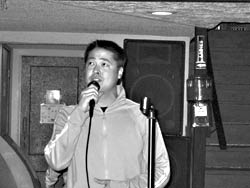Correction: The original article misidentified Schwartz’s lawyer. It is Diego Vargas, not Francisco Duarte.
Though a pretrial hearing in his case isn’t scheduled until May 29, one thing is already clear about the driver who struck City Council aide Matthew “Tatsuo” Nakata as he crossed a West Seattle street last November: He probably wasn’t getting any safe-driver discounts from Allstate.
At the time of the incident, Rabbi Ephraim Schwartz had at least eight moving violations on his record, including one incident in which a bicyclist was catapulted into the woods along Interlaken Drive on Capitol Hill.
Nakata, a 29-year-old aide to Seattle City Council member David Della, was hit by Schwartz’s 1991 Oldsmobile wagon while crossing Southwest Admiral Way. A diagram on a police report shows Nakata as a stick figure with a patch of blood around his head and a larger pool around his legs; he died that day from his injuries. Dan Donohoe, spokesperson for the King County prosecutor, says it appeared that Schwartz, 36, was using a cell phone when he hit Nakata, but the county declined to prosecute because Schwartz wasn’t intoxicated or driving recklessly.
The case was picked up by the city attorney’s office, which has charged Schwartz with “assault-injury by vehicle,” a gross misdemeanor. In cases like this, attorneys may be permitted to air a driver’s prior record in court, says Mike Finkle of the city attorney’s office. Schwartz’s lawyer, Diego Vargas, says if the city tries to do so in this case, he will oppose it, arguing it could prejudice the jury.
And no wonder. In a search of publicly available court documents, Schwartz’s name and birth date first pop up for a 1999 Ohio speeding offense. In the Norfolk area of Virginia, where the Schwartz family lived more recently, he was cited for disobeying a highway sign in March of ’02, and for disobeying a stop sign seven months later. The next year, Virginia cops ticketed Schwartz for allegedly failing to yield the right of way and displaying expired plates. Then he was cited for allegedly driving the wrong way down a one-way street. Virginia court records show that the latter three citations were eventually dismissed.
By 2004, Schwartz had established himself in Seattle, where he continued to drive in a less-than-exemplary fashion. Since December of ’04, Schwartz has racked up five traffic violations, according to Seattle Municipal Court records—meaning, at various times, he has disobeyed “traffic-control devices,” failed to wear a seat belt, run a red light, driven on the wrong side of the road, and manifested “inattention to driving” (an allegation that was reduced from speeding). One of those citations (the red light) occurred two months after the Nakata incident. (Washington state drivers have to amass six moving violations over a 12-month period before their licenses get—temporarily—suspended.)
Nor was Nakata the first person hit by Schwartz. Ilsa Govan, now a 32-year-old specialist in equity and race relations for Seattle Public Schools, was riding her new road bike in May 2005 down the snakelike forest passageway of Interlaken Drive when Schwartz came puttering up the hill on the wrong side of the street, according to the police report.
“I thought, I’m going to hit this car, and there’s nothing I can do about it,” says Govan. “I just kind of relaxed, and to be honest, that probably saved my life or at least saved me from broken bones.” She recalls Schwartz swerving away from her at the last moment, but not quickly enough: Govan ricocheted off the car, flew through the air and between trees, and landed kind of sitting up. She had broken her helmet and sustained “huge gashes” on her hand and ankle that had to be stitched up at a hospital, as well as other injuries that, all told, put her in physical therapy for a year. A police officer wrote in the incident report that her bike was totaled and Schwartz’s car was damaged “more so than I would have expected.”
“I started riding in Critical Mass [a bike activist group] after I got hit by the car,” says Govan, noting that the action hasn’t done much to strengthen her sense of security. “I got doored on the way home from physical therapy. People try to kill me every day—that’s how I look at it.”
When Schwartz and Govan met again in court, Govan remembers the rabbi being apologetic, even saying that he had had nightmares about the accident.
The rabbi did not return a call for comment.







